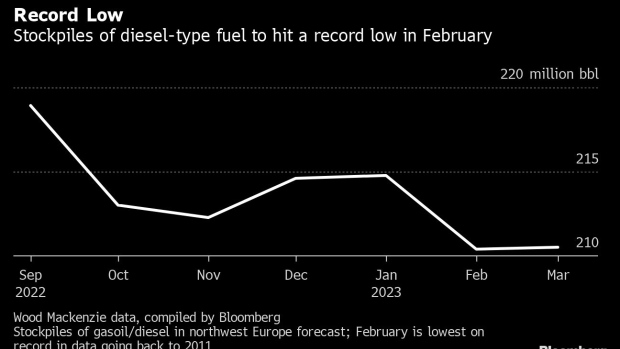Oct 19, 2022
Europe Diesel Stockpiles Set to Tank When Russian Supply Cut Off
, Bloomberg News

(Bloomberg) -- Inventories of diesel, the fuel that powers vast parts of the European economy, are forecast to plummet this winter as supplies from Russia are cut off.
The amount of diesel-type fuel stored in northwest Europe will sink to 210.4 million barrels in February, the lowest it has been since at least 2011, according to consultancy Wood Mackenzie Ltd. That’s the month that European Union sanctions on seaborne deliveries of refined petroleum products from Russia -- currently the region’s single biggest external diesel supplier -- come into play.
“The drop in February is expected due to the end of Russian imports, at a seasonally high demand period,” said James Burleigh, principal analyst at Wood Mackenzie. “Imports from alternative longer-haul sources may be constrained.”
The diesel market is already tight, with the fuel’s premium to crude oil well above seasonal norms around the world. In northwest Europe, stockpiles this month are expected to shrink by almost six million barrels, thanks to an uptick in planned refinery maintenance and the impact of strikes in France, according to Woodmac.
See also: Diesel Hits Chaos Mode in Fresh Blow for Global Economy
The consultancy expects a further decline to what will be a new low in its data in November -- until that is surpassed by February’s drop.
Part of the issue for stocks in Europe is the structure of diesel futures. The ICE gasoil curve is sharply backwardated -- a pattern where fuel for prompt supply is more expensive than for later delivery. That discourages storage, as traders can likely sell today at a better price than they can lock in for the future.
Yet while Europe’s diesel supply faces major disruption through the loss of Russian barrels, demand too could soon be pressured. Last month, the World Bank warned of a looming global recession, something that would likely take a big bite out of the world’s diesel consumption, potentially easing strained stockpiles.
Woodmac’s forecast data is from Sept. 30. Since then, strikes at French refineries have interrupted fuel production. The prolonged disruption could lower future stock forecasts further, according to the consultancy.
Read More: Asia’s Diesel Flows to Europe Near 3-Year High in Sept.: Vortexa
©2022 Bloomberg L.P.





